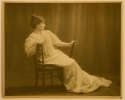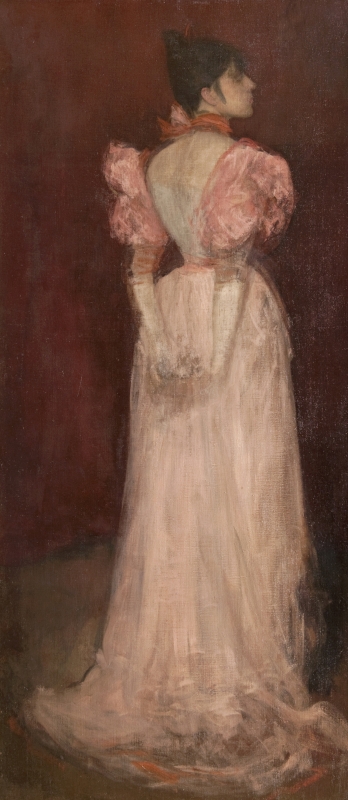Home > Catalogue > Browse > Rose et or: La Tulipe << >>
Titles
The recorded titles vary a lot in colour, and it is not always clear to which picture they refer:
- 'Rose et rouge; – la Tulipe' (1894, Société Nationale des Beaux-Arts). 1
- 'portrait in pink silk of Miss Phillips' [sic] (1894, E. G. Kennedy). 2
- 'the Girl in pink' (1894, E. G. Kennedy). 3
- Possibly 'the red picture' (1896, Whistler). 4
- Possibly 'the Red Bunnie' (1897, Whistler). 5
- 'Rose et Or: La Tulipe (unfinished)' (1904, ISSPG). 6
- 'Rose et or. La Tulipe. – (Rose and Gold. The Tulip).' (1905, Palais de l'Ecole des Beaux-Arts, Paris). 7
- 'Rose et Or – La Tulipe (Portrait of Miss Ethel Birnie Philip) (1936, University of Glasgow). 8
- 'Rose et or: La Tulipe' (1980, YMSM). 9
Since Whistler apparently had intended to exhibit this portrait with the Société Nationale in 1894 as 'Rose et rouge' (pink and red) it is possible that originally there was more red in the picture (the ribbon round her neck is still deep pink touched with coral red). Thus it is possible that references to a painting called 'the red lady' and 'the red Bunnie' (Whistler's nickname for Ethel was 'Bunnie') refer to Rose et or: La Tulipe, rather then to Red and Black: The Fan [YMSM 388], which was being painted around the same time.
The 'Tulipe' of the title may refer to the texture, colour and shape of the skirt or be a reflection of current Paris fashions. Whistler, Women and Fashion commented:
'The title suggests a Whistlerian combination of fashion and symbolism, equating a woman with a flower, in a dress of silky sheen with curling petal-like sleeves ... The dress may have been fresh from the dressmaker, and called Le Tulipe.' 10
'Rose et or: La Tulipe' is the generally accepted title. The Hunterian website commented:
'The title may be translated as 'Pink and Gold: The Tulip'. It was a fashionable conceit of the day to liken women to flowers, though it is possible the title refers to a style of dress. The sitter, Ethel Philip, is shown from behind, with her face in profile, an elegant pose which reinforces the possible reference to the graceful flower.' 11
Description
A full-length portrait of a woman seen from behind, with her face in profile to right, in vertical format. Her hands are clasped behind her back. She wears a pale pink low-necked evening dress with darker pink and coral/salmon colour ribbons around her neck. Her waistband and puffed elbow-length sleeves are also a darker pink. The dress is fitted to the waist, with the long skirt forming a fairly narrow 'tulip' shape, spreading out round her feet. Her hair is very dark, pinned up in a bun, with a short fringe and a curl in front of her ear. She may be holding a pale pink bouquet or gloves in her hands but this area is not clear. The background is a warm dark brown.
Sitter

W. & D. Downey, Ethel Whibley reclining in a chair, 1895/1903, platinum print, GUL Whistler PH1/51, 2491
This is one of a number of portraits of Whistler's sister-in-law, Ethel Philip, later Ethel Whibley (1861-1920). It was painted before her marriage to Charles Whibley (1859-1930).
Whistler took a close interest in women's dress, and the clothes worn by Ethel in his portraits follow the latest fashions. As she did not have a large income, they were probably copies of couture outfits, inspired by magazine illustrations (such as the one reproduced above) and made up by a dressmaker. 12
Notes:
1: Exposition Nationale des Beaux-Arts, Société Nationale des Beaux-Arts, Champ de Mars, Paris, 1894 (cat. no. 1184).
2: Kennedy to Whistler, 20 May 1894, GUW #07233.
3: Kennedy to Whistler, 6 November 1894, GUW #07242.
4: Whistler to E. G. Kennedy, [28 June 1896], GUW #09761.
5: Whistler to R. Birnie Philip, [26 July 1897], GUW #04712.
6: Fourth Exhibition, International Society of Sculptors, Painters and Gravers, Regent Street, London, 1904 (cat. no. 153).
7: Œuvres de James McNeill Whistler, Palais de l'Ecole des Beaux-Arts, Paris, 1905 (cat. no. 24).
8: James McNeill Whistler, University of Glasgow, Glasgow, 1936 (cat. no. 20).
9: YMSM 1980 [more] (cat. no. 418).
10: MacDonald 2003 [more], pp. 204-05.
11: The Hunterian website at http://collections.gla.ac.uk.
12: Ribeiro. Aileen, 'Fashion and Whistler' in MacDonald 2003 [more], pp. 16-51, at p. 40, fig. 40., and MacDonald, Margaret F., 'Love and Fashion: The Birnie Philips', ibid., pp. 196-201.
Last updated: 22nd October 2020 by Margaret







